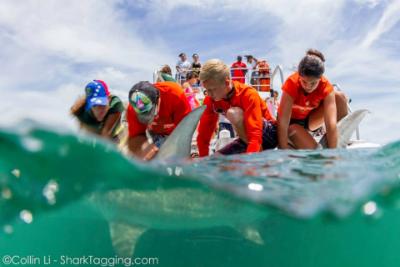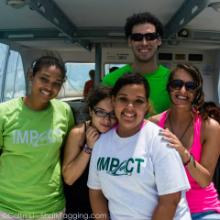More than 60 Miami high school students – and potential first generation college grads – will have the opportunity to bolster their science skills on shark research cruises this summer, thanks to a unique collaboration among the Center for Latin American Studies (CLAS) in the University of Miami College of Arts & Sciences, the RJ Dunlap Marine Conservation Program in the Rosenstiel School of Marine and Atmospheric Science (RSMAS), and the Patricia and Philip Frost Museum of Science.
 |
|
IMPACT Program participants observe as interns with the RJ Dunlap |
These three entities are working together to support the Latin American and Caribbean Integrated Marine Program and College Training (IMPACT) project – an initiative that helps at-risk high school students who are interested in science, math and technology take vital steps toward careers in these fields.
Funded through the U.S. Department of Education, IMPACT is part of the federal Upward Bound program, which focuses on helping low-income students from families in which neither parent holds a bachelor’s degree to complete high school and prepare for college.
IMPACT opened its doors in 1999, when the then-Miami Museum of Science (now the Patricia and Phillip Frost Museum of Science) became the first science museum in the nation to host an Upward Bound Math & Science Center.
IMPACT is “all about life experiences that the students would not get the opportunity to experience otherwise,” said Mickael Charles, College Bound advisor and manager of the Miami Upward Bound Math & Science Center. A member of the first cohort of students to participate in the IMPACT program, he joined the staff after graduating from Florida International University.
The IMPACT summer program focuses on college preparation (personal advising sessions, SAT preparation classes and financial aid workshops) – along with marine science and technology.
During the six-week Summer Marine Program, up to 65 IMPACT participants engage in hands-on, inquiry-based science, working in teams to complete research projects.
Shark tagging with the RJ Dunlap Marine Conservation Program is an integral part of this experience. On April 18, 12 IMPACT students, mentors and staff members set out on the Diver’s Paradise for a day of research.
Austin Gallagher, a RSMAS Ph.D. student, led the successful excursion, during which IMPACT students helped to workup and release three nurse sharks, two lemon sharks, and one great hammerhead shark.
With more than 1,000 miles of coastline, Florida is “the last frontier for sharks,” Gallagher said. He noted that the shark tagging trips are designed with the animals’ health in mind; all experiments are performed as quickly as possible, and none cause any permanent stress or injury to the sharks.
During the outings, RJ Dunlap interns work with IMPACT students to set out 10 specially designed shark bait systems. After one hour of soak time – when participants take environmental measurements such as water temperature and salinity – they lift each drumline individually to check for sharks.
 |
When a shark bites, it is quickly pulled up onto a special platform at the back of the boat, where a series of experiments are performed. These include measuring the shark, removing a small piece of its finclip, taking a blood sample, and attaching a tag to help track the shark for longer-term research.
RJ Dunlap scientists are conducting studies on tiger shark pregnancy, the impact of cultural attitudes on marine conservation, and how overfishing affects ocean ecosystems, among other research.
IMPACT leader Charles said that the shark tagging trips allow his students to expand their horizons, and to build confidence in themselves. “They learn that if they get the opportunity to do something new, they should do it,” he said.
“We are proud to have served as the catalyst to make this happen. It is very rewarding to see that the University of Miami can have such a positive impact on the future of our students, ” said CLAS Director and Weeks Professor in Latin American Studies Ariel C. Armony. “The Center for Latin American Studies connects people and organizations that otherwise would not work together. It has become a central point of reference for the Greater Miami community.”
Through the IMPACT school year program, University of Miami students provide participants with free tutoring in any subject area at the science museum’s state-of-the-art Teen Tech Center, which hosts 24 computer workstations where students can access the Internet and work with various educational software programs.
June 11, 2014

